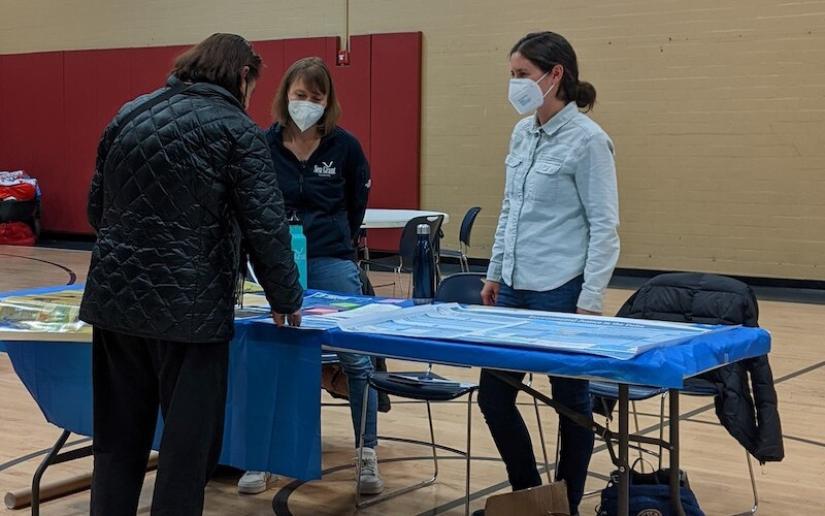There’s a massive push afoot to restore and protect the San Francisco Bay-Sacramento-San Joaquin Delta, which suffers from, among other issues, polluted waterways and degraded ecosystems. Restoration efforts have spawned countless research projects, from biological studies to historical surveys.
Recently, though, local leaders realized there’s something essential missing in this data: how the people of the Delta view this place. Later this month, California Sea Grant and the Delta Stewardship Council will launch a major effort to fill that gap: the Delta Residents Survey.
Jess Rudnick, the California Sea Grant extension specialist overseeing the project, noted that most governmental agencies are required to use the best available science in their decision-making — “but you can’t make decisions on data you don’t have,” she said.
Social science that considers people’s values, beliefs and behavior has often been left out, Rudnick said.
There’s a saying that’s sometimes passed around environmental agencies trying to address these issues: managers manage fishermen, not fish. The only way to impact the ecosystem is through people, which makes understanding social science all the more essential.

Filling the data gap
Rudnick was hired by California Sea Grant and the Delta Stewardship Council in 2020 precisely to help such agencies think about people. Like other state extension specialists, her role is to educate — but rather than the public, Rudnick targets state and local resource managers. She provides trainings on how to incorporate the insights of social science and conducts community outreach, attempting to understand the experiences of the Delta’s residents.
Rudnick came into the role knowing there wasn’t a ton of data.
“My job was to come in and chip away at that,” Rudnick said.
The Delta Resident Survey is her team’s latest — and by far their biggest —– chisel.
When the survey launches later this month, every resident in the rural center of the Delta — about 4,300 households — will receive a postcard by U.S. mail. A quarter of households in the surrounding urban and suburban region, about 70,000 homes, will be randomly selected to receive invitations as well — a statistically significant but more manageable portion of the population. The postcards will offer a personalized link and QR code that will send respondents to an online survey. Hard copies of the survey can be mailed upon request.
Rudnick hopes that the majority of responses will be received by late February, but noted that targeted follow-up may be necessary for particular regions with low response rates.
The survey should take 15 to 20 minutes to complete, and every participant will receive a $5 gift card for their time.
A detailed portrait of a complex place
In addition to collecting basic demographic information, the survey’s questions will cover three topics.
The first section will focus on residents’ values, priorities and satisfaction with their quality of life.
The second will address what Rudnick calls sense of place: people’s relationship to the region — why they live there, what the estuary means to them, and what they hope for their environment and communities.
The last section will gauge locals’ experience with environmental change. For example, how the recent flooding has affected them and how they'd like to see flooding and other environmental dangers addressed.
Researchers will share a summary and analysis of the responses via webinars and reports this summer. Rudnick hopes that the survey will become the first piece of a long-term project tracking how residents’ views and experiences shift through the years, which will help improve agencies’ responsiveness.
When Virginia Madueño, the council’s chair, learned of Rudnick’s plan for the survey she said it was music to her ears.
The Delta has a complex social history, and features immigrant communities and other underserved populations whose views were sometimes ignored, she said.
“We should not be repeating history,” Madueño said. “We have made bad decisions by not being more inclusive of all of the communities that we represent.”
The survey should be a major step forward.
Rudnick and her colleagues have been preparing for the survey’s launch for more than a year, a process that included discussions with several local community groups. California State University, Sacramento, home of the renowned Institute for Social Research, is a lead partner on the project. Other collaborating campuses include the University of California, Berkeley, and University of California, Davis, and Oregon State University.
About California Sea Grant
NOAA’s California Sea Grant College Program funds marine research, education and outreach throughout California. Headquartered at Scripps Institution of Oceanography at the University of California San Diego, California Sea Grant is one of 34 Sea Grant programs in the National Oceanic and Atmospheric Administration (NOAA), U.S. Department of Commerce.